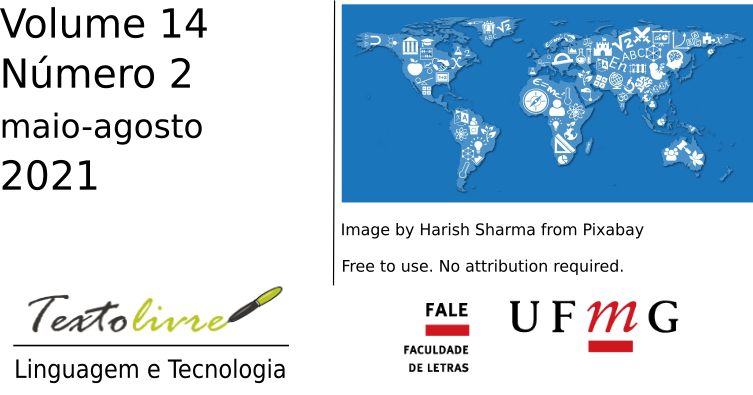Socioconstructivism, literacy and working with ICTs during the Coronavirus pandemic in 2020
DOI:
https://doi.org/10.35699/1983-3652.2021.34333Keywords:
Literacy, Remote teaching, SocioconstructivismAbstract
This paper intends to discuss the positive and negative points of the literacy teaching-learning work (MORAIS, 2013; 2014) during the coronavirus pandemic in 2020 from the point of view of a socio-constructivist theory (VYGOTSKY, 1991). Thus, specifically, we intend to discuss how the use of different Information and Communication Technologies (ICTs) impacts on the development of reading and writing in the children's literacy phase, especially which are the roles and actors of this process and how the student' proximal development zone (PDZ) is verified. The results show that a negative point of the exclusive use of ICTs in teaching, both in synchronous and asynchronous activities, is the difficulty in diagnosing the students' level of learning. After all, through face-to-face teaching, it is possible to check the student's progress during the literacy process and, thus, diagnose the development of the PDZ by several ways. A positive point is the valorization of the student's autonomy in the teaching-learning process of reading and writing. As a result, there is also an appreciation of the teacher's mediating role. In addition, family members (parents, grandparents, etc.) who have accompanied this child during remote classes have also started to act, as well as teachers, as mediators in the teaching-learning process.
Downloads
References
BRASIL. Política Nacional de Alfabetização. [S.l.]: Brasília: MEC, SEALF, 2019. Disponível em: http://alfabetizacao.mec.gov.br/. Acesso em: 19 jun. 2021.
IVIC, Ivan. Lev Semionovich Vygotsky. Recife: Fundação Joaquim Nabuco, Editora Massangana, 2010.
MOLL, Luis C.; GREENBERG, James B. Creating zones of possibilities: Combining social contexts for instruction. In: MOLL, Luis C. (Ed.). Vygotsky and Education. 1. ed. [S.l.]: Cambridge University Press, nov. 1990. p. 319–348. DOI: 10.1017/CBO9781139173674.016. Disponível em: https://www.cambridge.org/core/product/identifier/CBO9781139173674A025/type/book_part. Acesso em: 19 jun. 2021.
MORAIS, José. Alfabetizar para a Democracia. Porto Alegre: Penso Editora, jun. 2014.
MORAIS, José. Criar leitores: para professores e educadores. Barueri: Manole, 2013.
NATIONAL EARLY LITERACY PANEL. Developing early literacy: report of the national early literacy panel. A scientific synthesis of early literacy development and implications for intervention. Washington, 2009. Disponível em: https://lincs.ed.gov/publications/pdf/NELPReport09.pdf. Acesso em: 19 jun. 2021.
NATIONAL READING PANEL. Teaching children to read: an evidence-based assessment of the scientific research literature on reading and its implications for reading instruction. Washington, 2000. Disponível em: https://www.nichd.nih.gov/sites/default/files/publications/pubs/nrp/Documents/report.pdf. Acesso em: 19 jun. 2021.
NEWMAN, Fred. Lev Vygotsky - Cientista revolucionário. São Paulo: Edições Loyola, mar. 2002.
SÉNÉCHAL, Monique; YOUNG, Laura. The Effect of Family Literacy Interventions on Children’s Acquisition of Reading From Kindergarten to Grade 3: A Meta-Analytic Review. Review of Educational Research, v. 78, n. 4, p. 880–907, dez. 2008. DOI: 10.3102/0034654308320319. Disponível em: http://journals.sagepub.com/doi/10.3102/0034654308320319. Acesso em: 19 jun. 2021.
SHANAHAN, Timothy; SHANAHAN, Cynthia. Teaching Disciplinary Literacy to Adolescents: Rethinking Content- Area Literacy. Harvard Educational Review, v. 78, n. 1, p. 40–59, abr. 2008. DOI: 10.17763/haer.78.1.v62444321p602101. Disponível em: https://meridian.allenpress.com/her/article/78/1/40/31935/Teaching-Disciplinary-Literacy-to-Adolescents. Acesso em: 19 jun. 2021.
SKINNER. Behavior of Organisms. New York: Appleton-Century-Crofts, 1983.
VYGOTSKI, L. S. A Formação Social da Mente: o Desenvolvimento dos Processos Psicológicos Superiores. São Paulo: Martins Fontes, 1991.
WASIK, Barbara Hanna. Handbook of Family Literacy. New Jersey: Lawrence Erlbaum Associates, 2004.
Downloads
Published
How to Cite
Issue
Section
License
Copyright (c) 2021 Texto Livre: Linguagem e Tecnologia

This work is licensed under a Creative Commons Attribution 4.0 International License.
This is an open access article that allows unrestricted use, distribution and reproduction in any medium as long as the original article is properly cited.











